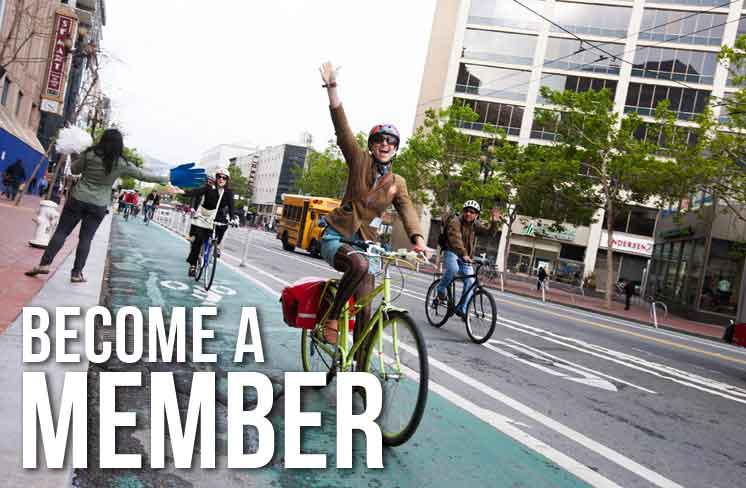Candidate Facts
 |
Name: Berta Hernandez Campaign Website: bertahernandezforsupervisor2016.com |
Candidate Questionnaire
All official candidates were contacted and given the opportunity to answer our Candidate Questionnaire. Any candidate responses edited for length and clarity have been marked as such.
1. Do you ride a bicycle in the city?
No
2. The City has established a goal to at least double the number of bike trips in the next 3 years. Do you support this goal?
Yes [RESPONSE TRUNCATED]
If yes, what would you do as Supervisor to help the city realize it?
As the socialist candidate, I am for free, safe, high-quality bicycles on demand, made to order for all who desire them. In the meantime, the City should implement a bike share program to make more bicycles available to low income San Franciscans. Not only that, the City should sponsor public facilities to repair bikes and teach people how to repair bikes. In my case, I would even benefit from a bicycle repair specialist who made house calls. [RESPONSE TRUNCATED]
3. Our City has embraced and adopted Vision Zero, the goal to eliminate all fatalities and serious injuries on our streets by 2024. Do you support Vision Zero?
Yes [RESPONSE TRUNCATED]
If “Yes,” the city has yet to make significant process since the introduction of Vision Zero in 2014. In fact, fatalities are on the rise. What would you do as Supervisor to help the city achieve Vision Zero?
Most of the fatalities happen on street corners when drivers turn corners too fast to react to pedestrians in crosswalks. I want to slow down traffic on Mission Street. We need a transit plan that designates certain streets for public transit, pedestrians, and non-motorized vehicles only and diverts private autos to freeways and parallel streets, with perhaps certain times designated for deliveries. There is lots of room for creativity, compassion, and applied science on this issue. This is the kind of expertise I hope to access with the creation of a democratically elected council of District 11 residents. [RESPONSE TRUNCATED]
4. Research and data has shown that building high-quality protected bike infrastructure is the most effective way to increase the number of people who bike. Despite this, there remain very few streets and corridors in San Francisco with protected bike lanes. Do you support the significant expansion of protected bike infrastructure, recognizing that this is often achieved by reallocating space on our streets that may decrease on-street car parking or vehicle travel lanes?
Yes
If “Yes,” what is at least one street or corridor in your District that you think would most benefit from a protected bike facility and why?
The determination of where and how to improve bike infrastructure needs to be done in coordination with transportation experts (like the SF Bicycle Coalition, among others) and the residents of the District. It is of critical importance that something that will have such a profound effect on transit in the District not be imposed from the outside; otherwise it is bound to fail. There is lots of room for creativity, compassion, and applied science on this issue. This is the kind of expertise I hope to access with the creation of a democratically elected council of District 11 residents. [RESPONSE TRUNCATED]
5. The SF Bicycle Coalition participated in the Mayor’s Transportation 2030 Task Force, which identified significant funding gaps for a safe, reliable transportation system. To continue building out the bike network, the original need until 2030 was $360 million, which has now increased to $660 million, by City estimates. Do you support increased allocation and funding for bike projects to at least match the percentage of San Franciscans who bike?
Yes [RESPONSE TRUNCATED]
6. The Department of Public Health has used data to develop the “high-injury network” to show the 12% of city streets where over 70% of the collisions occur. This map has also shown that low-income communities are disproportionately affected by traffic collisions. If Supervisor, what would you do to prevent collisions in your District at these known locations?
I think we already said that creating dedicated corridors for pedestrians, bikes, and public transit and diverting private automobiles away from these corridors (as well as problem intersections) are critical measures that we can and should take to reduce collisions. We also need to come up with ways to enforce speed limits and protect pedestrians and cyclists that do not rely on police, like more civilian crossing guards, for instance. I am interested to look at this map and talk to concerned citizens, like you, as well as other transit experts to consider other ways to reduce collisions. [RESPONSE TRUNCATED]
7. Market Street is San Francisco’s most-biked street, with nearly 7,000 trips by bike counted here every day. The City is working on the Better Market Street project, which calls for limiting private automobiles, creating a continuous, protected bike lane for the full length of the project from the Embarcadero to Octavia Boulevard and significantly advancing transit and pedestrian-friendly street design. Do you support this plan?
Yes [RESPONSE TRUNCATED]
8. Data has shown that the five most dangerous behaviors are all driver-related offenses: speeding, failure to yield to pedestrians, improper right-hand turns, running red lights and failure to stop at stop signs. The San Francisco Police Department has committed to maintaining 50% of their traffic citations to “Focus on the Five,” a goal they have yet to meet citywide. Do you support Focus on the Five and smart, data-driven enforcement?
Yes [RESPONSE TRUNCATED]
9. As Supervisor, what will you do to ensure SFPD focuses enforcement on Focus on the Five or other known issues that make our streets unwelcome to bike on, such as double-parking in bike lanes, rather than ad hoc, complaint-driven enforcement?
We support “Focusing on the Five,” and it is hard in principle to oppose smart data-driven enforcement. However, given the relationship of police with communities of color, we think that giving police the opportunity and the excuse to make more traffic stops is bad for public health. We need to find a different agency to guarantee that people understand and follow traffic regulations. [RESPONSE TRUNCATED]
10. Bay Area Bike Share is in the middle of a game-changing, tenfold expansion of its system to become one of the densest bike share networks in the United States. Do you support the expansion and placement of bike share stations in your District, even if this may mean repurposing of on-street vehicle parking?
Yes [RESPONSE TRUNCATED]
District-Specific Questions
1. The Planning Department led the Ocean Avenue Corridor Design Study, which was completed in 2015 after extensive public outreach. Recommendations in the study included a redesign and plaza treatment for the intersection of Ocean, Phelan and Geneva Avenues as well as the inclusion of a westbound bike lane between I-280 and Phelan Avenue. Do you support the study’s findings?
[NO RESPONSE GIVEN]
2. As San Francisco becomes a more expensive city to live in, we know that biking provides an affordable and sustainable way to get around. To increase access to bikes, the SF Bicycle Coalition organizes and leads the Bike it Forward program. We reclaim unclaimed and abandoned bikes from the SFMTA, BART, the SFPD and other agencies, which are then repaired with the help of our volunteers. Neighborhood residents sign up with our partner organizations in advance to participate and receive a bike. As Supervisor, do you support this program and its expansion?
Yes
3. Do you agree that biking is an affordable mode of transportation?
Yes [RESPONSE TRUNCATED]
If “Yes,” what would you do as Supervisor to increase biking in your District?
As the socialist candidate, I am for free, safe, high-quality bicycles on demand, made to order for all who desire them. In the meantime, I think the City can provide subsidies and incentives to increase the bike share program. We can also invest in bike repair shops where kids and youth can learn how to fix bikes. All youth and children should have access to a bike. If they can’t pay for them, the City should pay for them. More bikes, more spaces for bikes, and more bike lanes will encourage people to bike more. [RESPONSE TRUNCATED]

